Soaked tulsi (holy basil) leaves have been traditionally used for skin care, including acne treatment, but scientific evidence remains limited. Tulsi’s antibacterial and anti-inflammatory properties may help reduce acne bacteria and soothe skin, yet soaked leaves alone are not a guaranteed cure and should complement broader skincare routines.
Tulsi, also known as holy basil, has long been treasured in Ayurveda for its medicinal and healing properties. A popular home remedy circulates that soaking tulsi leaves in water and applying the “tulsi water” or paste helps cure acne naturally. But what does modern science say about this age-old claim? This fact check delves into whether soaked tulsi leaves can truly live up to their reputation as an acne cure.
Traditional Use and Ayurvedic Perspective
In Ayurveda, tulsi is valued for its antibacterial, anti-inflammatory, and antioxidant properties, contributing to its use in reducing skin inflammation, controlling bacterial infections, and promoting detoxification. The herb’s warm and clarifying energy is believed to aid skin health by balancing excess oil and cleansing pores, factors linked to acne formation.
Scientific Evidence and Limitations
While research indicates that tulsi contains compounds that can fight acne-causing bacteria and minimize inflammation, robust human clinical trials on soaked tulsi leaf water specifically are lacking. Studies highlight tulsi’s potential topical antioxidant action, supporting skin healing and combating oxidative damage that can worsen acne, but it is not a stand-alone cure.
Practical Use and Recommendations
Soaking tulsi leaves overnight and applying the strained water has anecdotal benefits for calming skin and reducing minor breakouts. Many practitioners recommend using tulsi as part of a comprehensive skin-care regimen involving cleansing, hydration, and protection, rather than relying solely on tulsi water. It’s also noted that stress management and lifestyle improvements play an essential role in acne treatment.
Expert Advice
Dermatologists affirm that tulsi’s antibacterial properties can complement acne treatment but caution against expecting miraculous results from soaked leaves alone. Good skincare hygiene, topical and oral medications when required, and consultation with specialists remain the cornerstone of effective acne management.
In summary, soaked tulsi leaves offer supportive benefits but should be seen as an adjunct, not a cure, for acne. Integrating tulsi within a holistic skincare routine may enhance skin health while avoiding unrealistic expectations.
Sources: THIP Media, Healthline, InShorts, Ayurveda blogs, Dermatology insights

